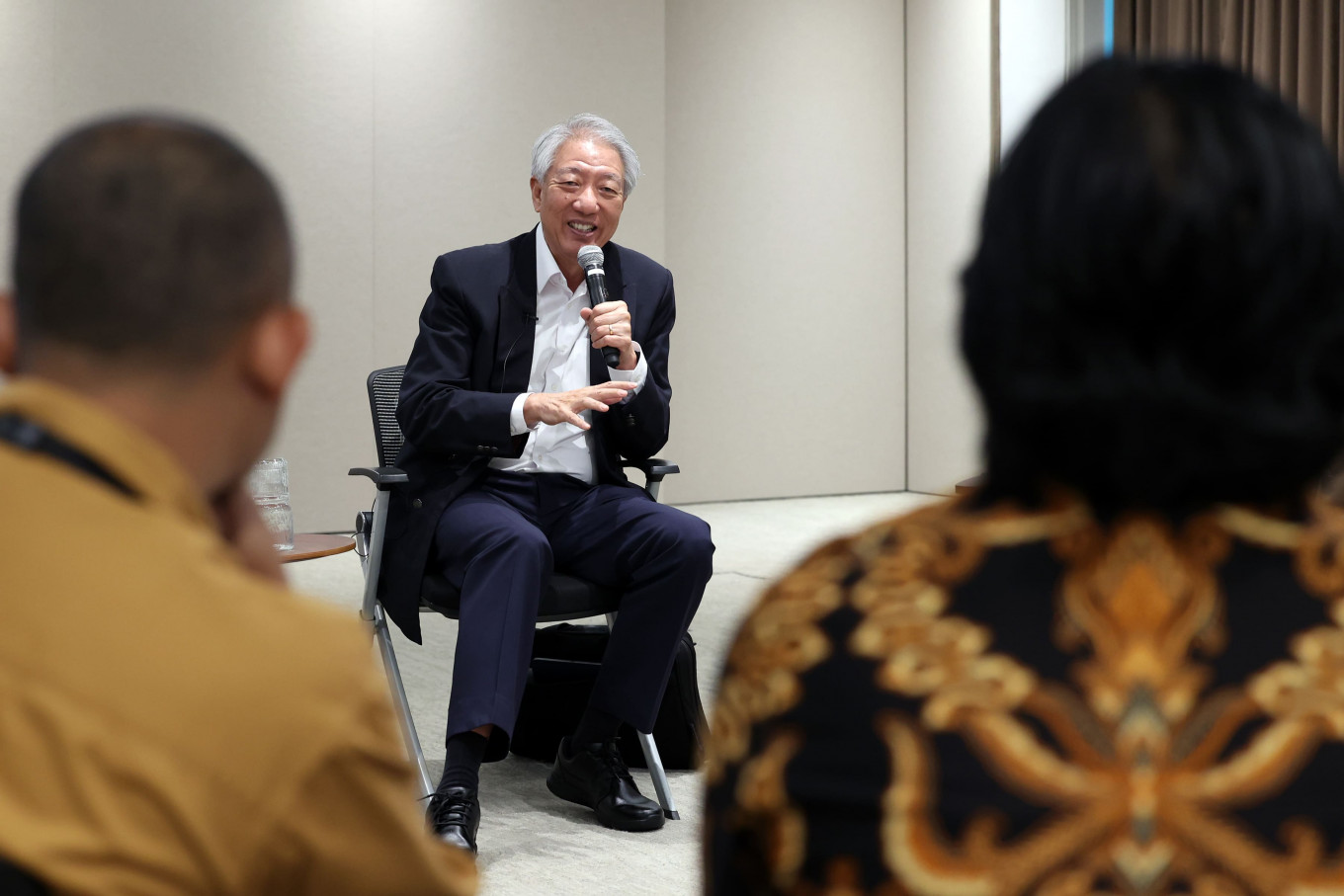Popular Reads
Top Results
Can't find what you're looking for?
View all search resultsPopular Reads
Top Results
Can't find what you're looking for?
View all search resultsSingapore seeks green power imports elsewhere
Indonesia may forgo a chance to export electricity as Singapore looks to other ASEAN countries and Australia, which seem to be more ready to supply the city state with clean power.
Change text size
Gift Premium Articles
to Anyone
S
ingapore is looking to other ASEAN countries as alternatives to importing “green electrons”, its term for electricity produced from renewable energy, as its discussions with Indonesia remain uncertain.
Singaporean Senior Minister Teo Chee Hean said officials of the city state had visited several countries, particularly in Southeast Asia.
Teo, who is also Singapore’s chairman of the Inter-Ministerial Committee on Climate Change, added that Singapore had been in talks with Australian companies, some of which had expressed interest in supplying Singapore with green electricity.
“Well, not just from Indonesia,” Teo said during an interview with Indonesian news outlets in Singapore on July 6.
Singapore needs to import clean energy to achieve its 2030 Green Plan goals and 2050 net-zero target, according to the 2023 Southeast Asia’s Green Economy report, published on Tuesday by Bain & Company, Temasek, GenZero and Amazon Web Services.
Electricity demand in the city state is projected to reach 18 gigawatts in 2050, but its own renewable energy resources potential is only 0.4 GW, the report states.
According to Institute for Essential Services Reform (IESR), 95 percent of Singapore’s electricity comes from natural gas, but the country plans to convert up to 30 percent to renewable sources. Starting in 2035 it is looking to generate 4 GW from renewables.
Indonesia has sent out mixed signals regarding the export of power from renewable sources.
In June last year, the Investment Ministry pushed for a ban on such exports, arguing that the country needed to ensure it had enough green power for its own industries, but the Energy and Mineral Resources Ministry said there was more than enough potential to meet domestic and export needs.
Nevertheless, Jakarta suspended clean power exports last summer, long after some Singaporean firms had inked deals with Indonesian counterparts to generate renewable energy in Indonesia and transmit it to the city state.
In May 2023, Coordinating Maritime Affairs and Investment Minister Luhut Pandjaitan reaffirmed the move, but he suggested that Singapore build a renewable components factory in the country to have the suspension lifted.
Teo admitted that Singapore would need to look at cross-border solutions to meet its climate goals and said it was still considering imports from Indonesia, despite Jakarta’s current stance on the matter.
“If Indonesia is prepared to export green electrons to us, we are prepared to buy,” Teo said, adding that the city state was more than willing to purchase the electricity at international prices.
The energy ministry did not immediately respond to a request for comment on Indonesian renewable energy exports to Singapore.
Fabby Tumiwa, executive director at think-tank IESR, told The Jakarta Post on Monday that Singapore was indeed looking to Thailand, Vietnam, Laos and Cambodia, all of which had made significant progress in the development of renewable energy.
“A Cambodian company was already in talks to enter Singapore,” Fabby said.
However, these countries were located far from Singapore, and importing renewable electricity from them would require lengthy transmission and subsea cables, which could be risky and inefficient.
“We are closer to Singapore. Indonesia still has the opportunity [to capitalize on Singapore’s clean power demand], for now,” Fabby said, but he noted that, if the country did not act quickly, others would.
He said red tape would be holding Indonesia back unless the government did something to tackle it. “It could be a loss for us, we’d lose the opportunity to dominate the market,” Fabby said.
Furthermore, Malaysia, which is as close to Singapore as Indonesia, lifted its electricity export ban this year, two years after imposing it.
The opportunity could help push the development of domestic renewable energy, including demand for industries producing components for clean energy, such as solar photovoltaic.
Maulida Rahma, renewable energy campaigner at Trend Asia, told the Post on Monday that exporting power from renewable sources should be done with caution, as many parts of Indonesia still lacked electricity, due in part to a lack of connections between grids in different regions of the country.
She urged the government to speed up the phasing-out of coal power.










